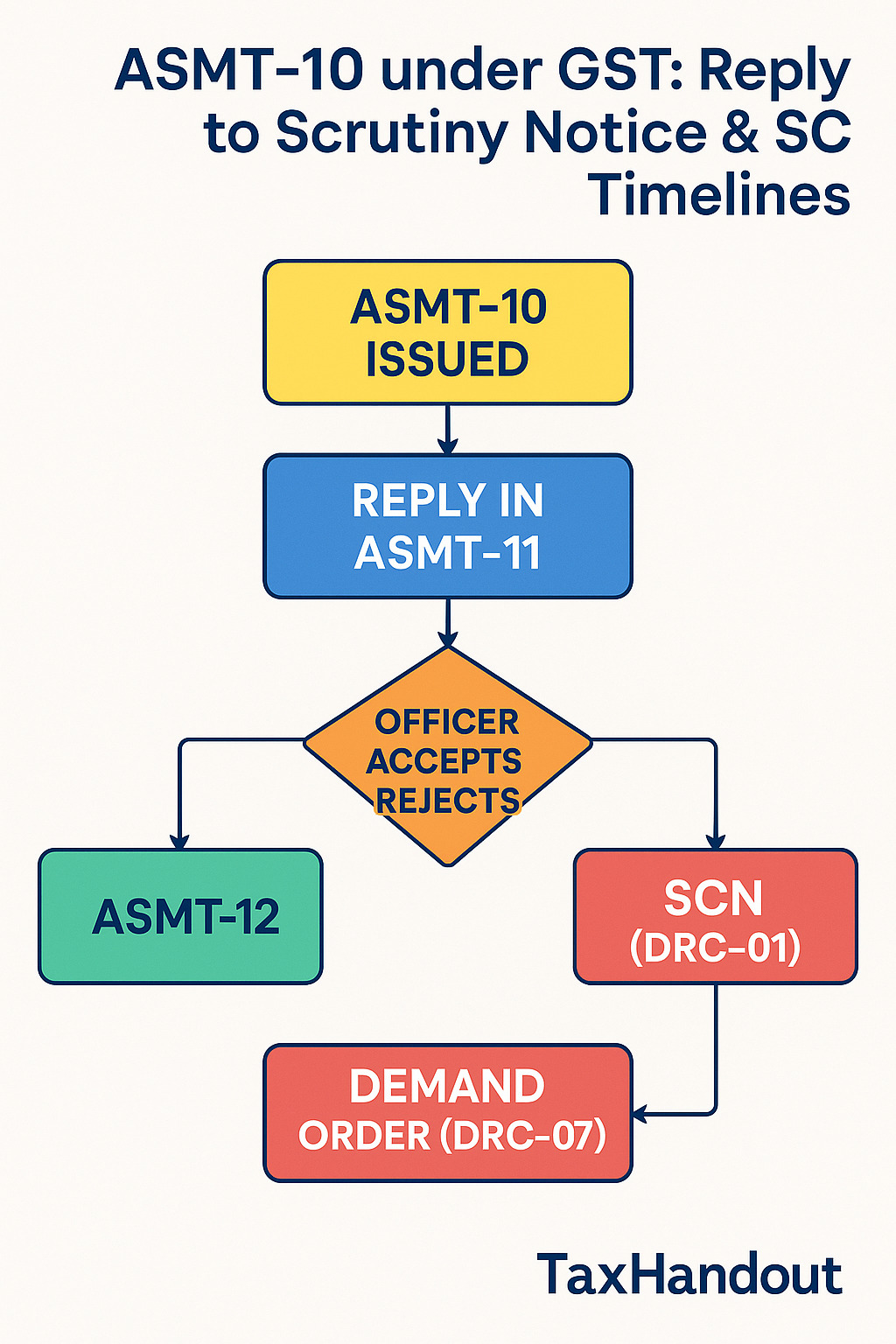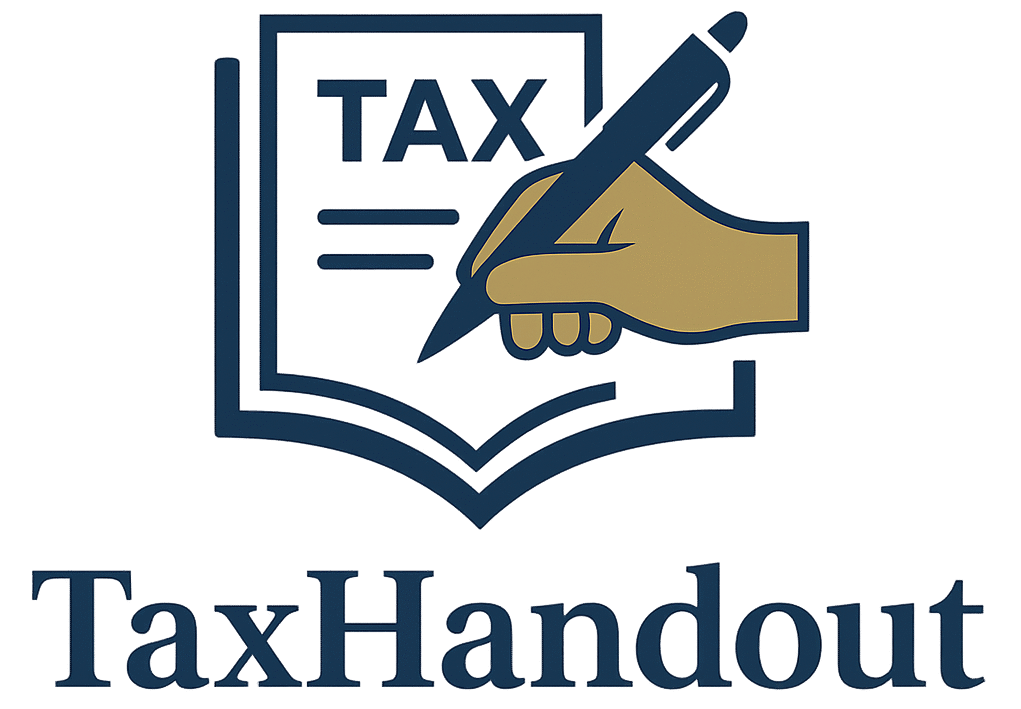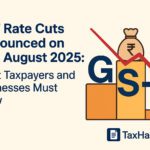1. Introduction
The GST law empowers officers to scrutinize returns filed by taxpayers to ensure correctness and detect mismatches. This is done through ASMT-10, issued under Section 61 of the CGST Act, 2017 read with Rule 99 of CGST Rules.
Getting an ASMT-10 notice does not always mean you are guilty of evasion—it is a chance to clarify discrepancies. However, a weak or late reply can lead to demand notices (DRC-01) and prolonged litigation.
This handout explains meaning, procedure, reply format, SCN deadlines, and practical tips for dealing with ASMT-10 effectively.
2. Legal Provisions Governing ASMT-10
- Section 61 of CGST Act: Officer may scrutinize returns and related particulars.
- Rule 99(1): If discrepancies are found → issue ASMT-10.
- Rule 99(2): Taxpayer to reply in ASMT-11 within time prescribed.
- Rule 99(3): If officer accepts reply → issue ASMT-12 (Acceptance Order).
- Section 73 / 74: If reply unsatisfactory → issue Show Cause Notice (SCN) in DRC-01.
3. What is ASMT-10?
ASMT-10 is a notice of discrepancies found in your returns or related data. It contains:
- Details of mismatch or anomaly
- Tax period involved
- Grounds of discrepancy
- Time limit for reply (generally 15 days)
👉 Important: Non-reply or weak reply can directly lead to SCN under Section 73/74.
4. Common Reasons for Issuance of ASMT-10
ASMT-10 is typically issued when department finds variances such as:
- Mismatch in outward supplies:
- GSTR-1 vs GSTR-3B
- E-way bill vs GSTR-1
- Mismatch in ITC claimed:
- GSTR-3B vs GSTR-2A/2B
- ITC claimed on blocked credits (Section 17(5))
- Inverted duty cases: Refund claimed but no proper matching.
- Turnover mismatch: GST vs Income Tax Return (ITR) vs Audit report.
- Excess refund claimed on account of zero-rated supply.
- Wrong classification / rate applied in invoices.

5. Step-by-Step Process to Reply to ASMT-10 (Form ASMT-11)
(A) On GST Portal
- Login → Services → User Services → View Additional Notices & Orders.
- Select the issued ASMT-10 notice.
- Click Reply (ASMT-11).
- Draft your reply with proper reasoning.
- Upload supporting documents (invoices, reconciliation sheets, ledgers, payment challans).
- Submit reply with DSC/EVC.
(B) Content of Reply (ASMT-11)
- Reference of Notice (ASMT-10 No. & Date).
- Factual explanation point-wise.
- Documentary proof attached.
- If tax is payable → pay via DRC-03 and attach challan copy.
- Request for closure of proceedings.
6. Format / Specimen
Notice No: ………………….
Date: ………………….
To: GSTIN XXXXXXX
Subject: Discrepancies noticed in return for Period: April–June 2024
Discrepancy:
ITC claimed in GSTR-3B = ₹15,00,000
ITC available in GSTR-2B = ₹13,50,000
Difference = ₹1,50,000
You are required to reply within 15 days in FORM ASMT-11.
Draft Reply in ASMT-11 (Sample)
Respected Sir,
With reference to ASMT-10 Notice No…….. dated…….. for April–June 2024,
we submit as follows:
- The difference in ITC is due to late filing of GSTR-1 by suppliers.
- The same invoices have now appeared in GSTR-2B of July 2024.
- Reconciliation statement attached as Annexure A.
Hence, there is no excess ITC claimed.
We request you to kindly drop the proceedings and issue ASMT-12.
Thanking You,
For XYZ Pvt Ltd
Authorized Signatory
7. Consequences of Non-Reply
- ASMT-12: If reply is accepted → no action.
- SCN (DRC-01): If reply unsatisfactory → demand proceedings under Sec 73/74.
- DRC-07: Final demand order.
8. Limitation Period for Issuing SCN (DRC-01) After ASMT-10
| Nature of Case | Section | SCN (DRC-01) Deadline | Order Deadline |
| Non-fraud cases (Section 73) | 73(10) | 3 years from due date of annual return of FY | 3 years + 3 months (Order) |
| Fraud cases (Section 74) | 74(10) | 5 years from due date of annual return of FY | 5 years + 3 months (Order) |
Example:
- FY 2021-22 → Annual Return due 31 Dec 2022.
- SCN under Sec 73 → latest by 31 Dec 2025.
- SCN under Sec 74 → latest by 31 Dec 2027.
Thus, the department cannot issue SCN beyond these timelines, even after ASMT-10.
9. Judicial References
- Madras HC in Vardhan Infrastructure Pvt Ltd (2022): Held that scrutiny under Sec 61 is preliminary; proper opportunity must be given before issuing SCN.
CBIC Instruction No. 02/2022-GST: Emphasized timely issue of ASMT-10 and monitoring closure of scrutiny cases.
10. Practical Challenges in ASMT-10
- Short reply time (15 days) – difficult for large reconciliations.
- System mismatches – GSTR-2B vs actual invoices.
- Repeated scrutiny – multiple ASMT-10 for same year.
- No clarity on adjustments when supplier rectifies later.
11. Professional Tips
- Keep monthly reconciliation of GSTR-3B, GSTR-1, GSTR-2B, books.
- Always download notices from portal – email/SMS is just an intimation.
- Pay voluntary liability via DRC-03 if discrepancy genuine.
- Preserve working papers & reply copies for audit trail.
- Track limitation dates for SCN – many notices get time-barred.
12. Conclusion
ASMT-10 is an early warning system, not a penalty notice. A proper and well-documented reply in ASMT-11 can save unnecessary litigation. At the same time, taxpayers must be aware of SCN timelines under Section 73/74, which act as a statutory safeguard against delayed demands.
👉 Key Message: Be prompt, be precise, and be prepared—ASMT-10 is an opportunity, not a threat.

